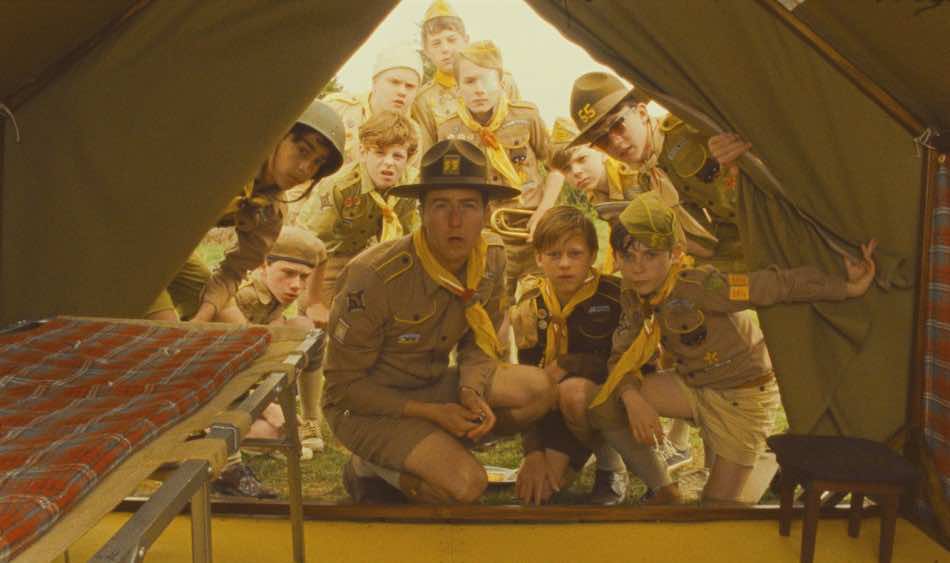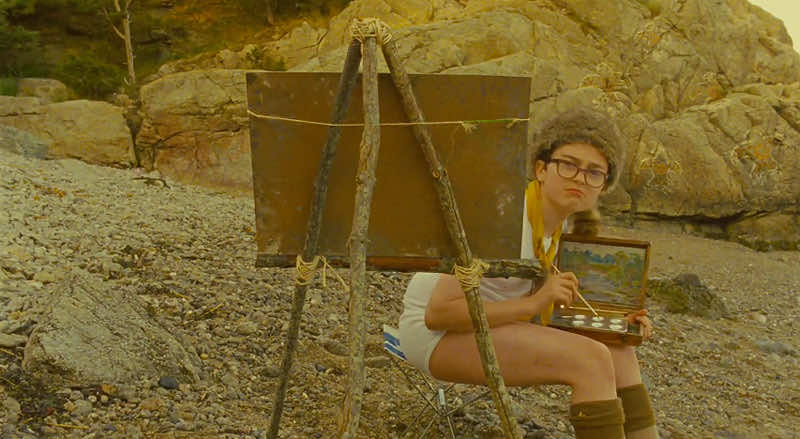
Moonrise Kingdom is not your typical Wes Anderson film. As a long-time fan, I have always thought his films existed in some hyper-real dimension of unreality and loved them for it. But Moonrise Kingdom shows Anderson taking a turn into almost surrealistic territory with a more focused mise-en-scène and a subtle shift in tone. Most of his previous films, even his 2009 puppet-populated stop motion masterpiece Fantastic Mr. Fox (Fantastic Mr. Fox lives up to its title), possess a sardonic, sometimes mean-spirited tragi-humor. Moonrise Kingdom reeks of so much innocence and purity it exists as a slight detour from Anderson’s usual aesthetic. Despite taking place mostly outdoors, Anderson heightens his usual stagey feel, his actors behave stiffer than usual and he introduces a more atmospheric score, working with Alexandre Desplat for a second time. Long after the film has ended it sticks with you like a pleasant little memory.
The film follows Sam (Jared Gilman), a 12-year-old orphan who has run away from his “Khaki Scout” camp on an island off the coast of New England in the summer of 1965. When Scout Master Ward (Edward Norton) finds Sam missing (“Jiminy Cricket, he flew the coop!”), he gathers the other scouts for a search party.  They arm themselves with some scary weaponry for some strange reason. But any sense of foreboding dread is subverted by the perky bounce of plucked string instruments from a classical piece called “Playful Pizzicato” on the film’s soundtrack. Sam has made plans to meet his pen pal Suzy (Kara Hayward). She is also 12 and has run away from her own oppressive atmosphere: her bitter, lawyer parents (Bill Murray and Frances McDormand) and three hyperactive, younger brothers. These two are probably Anderson’s most innocent duo at the center of the drama since Dignan and Anthony (Owen and Luke Wilson in their own debut roles) in Bottle Rocket (1996).
They arm themselves with some scary weaponry for some strange reason. But any sense of foreboding dread is subverted by the perky bounce of plucked string instruments from a classical piece called “Playful Pizzicato” on the film’s soundtrack. Sam has made plans to meet his pen pal Suzy (Kara Hayward). She is also 12 and has run away from her own oppressive atmosphere: her bitter, lawyer parents (Bill Murray and Frances McDormand) and three hyperactive, younger brothers. These two are probably Anderson’s most innocent duo at the center of the drama since Dignan and Anthony (Owen and Luke Wilson in their own debut roles) in Bottle Rocket (1996).
Anderson sets up the action at a leisurely pace, though it still seems to overflow with information. The film starts with neat, symmetrical shots of the interior of Suzy’s three-story, brilliant red home. The camera tracks through large rooms that, through props and the inhabitants’ activities, date the home to its mid-1960s time frame. The family members mostly stay apart from one another. Suzy reads and looks out of the house through binoculars, a not-so-subtle quirk that reveals her longing to escape. The camera explores the home with neat zooms and smooth pans from one room to another, as the boys listen to “The Young Person’s Guide to the Orchestra, Op. 34: Themes A-F” by Benjamin Britten on a portable record player. The exterior, with its perfectly pruned shrubbery and immaculate red paint job contextualize the neatness inside the home. From the outside the house’s paint job seems so polished, it looks like a doll house.
The set pieces throughout the film seem almost fetishistic in the attention to detail that produced them. In a parallel to this introduction of Suzy’s living conditions, Anderson offers an indulgent tour of Sam’s scout camp, Camp Ivanhoe. The scene opens with a kid with an eye-patch (Charlie Kilgore) blowing a wake-up call on a bugle.  During a long tracking shot, the camera follows Scout Master Ward making the rounds as he accounts for all his troops. He stops next to one small group of busy boys after another, as they work on projects of various quality and ingenuity. While some practice their bow and arrow skills, others concoct an outhouse with plumbing made of sticks, water pails and a bell. Ward lingers a moment with each group to offer criticism before striding on to the next batch of industrious lads.
During a long tracking shot, the camera follows Scout Master Ward making the rounds as he accounts for all his troops. He stops next to one small group of busy boys after another, as they work on projects of various quality and ingenuity. While some practice their bow and arrow skills, others concoct an outhouse with plumbing made of sticks, water pails and a bell. Ward lingers a moment with each group to offer criticism before striding on to the next batch of industrious lads.
Of all the films in Anderson’s career, Moonrise Kingdom mostly recalls Fantastic Mr. Fox. Even the many outdoor scenes have a stagey quality. There are moments of action that include a bloody death and several scenes with explosions, but Anderson has stylized the action, which include quick cuts of still animation, to such an extent there is nothing too horrific about it. The characters also deliver their lines more stiff than I have ever seen in an Anderson film. They may have well been puppets themselves. Here are two short clips that offer a good taste of what I mean:
Though Murray makes his sixth appearance in an Anderson film and Jason Schwartzman his fourth, the film also features many new faces for an Anderson film. Both children in the lead roles make their big screen debuts with Moonrise Kingdom, and they do a decent job. There are also major acting forces new to the Anderson stable besides Norton and McDormand, like Bruce Willis, Tilda Swinton, Harvey Keitel and Bob Balaban. All these new faces delivering the terser-than-usual Anderson lines (this script was also co-written by Roman Coppola) makes for a slightly jarring effect. Some (Keitel and Balaban) do it better than others (McDormand, Swinton, Willis, Norton).  But the style of acting does not feel much different from that of the recently hyped Greek New Wave cinema*, which also tells stories as if so aware of the cinematic limitations of representing “reality,” it skips naturalistic acting for the cold distance of human vessels delivering lines. It only heightens the surreal, nostalgic memory of long-past experiences. After all, most of the film follows the two 12-year-old kids at the heart of the film as they try to carry on a passionate love affair of 12-year-old proportions.
But the style of acting does not feel much different from that of the recently hyped Greek New Wave cinema*, which also tells stories as if so aware of the cinematic limitations of representing “reality,” it skips naturalistic acting for the cold distance of human vessels delivering lines. It only heightens the surreal, nostalgic memory of long-past experiences. After all, most of the film follows the two 12-year-old kids at the heart of the film as they try to carry on a passionate love affair of 12-year-old proportions.
Using Sam’s camping skills, they disappear to the hidden inlet they Christian “Moonrise Kingdom.” Suzy reads from her young adult fantasy books like “The Girl From Jupiter,” “The Francine Diaries” and “The Seven Matchsticks.” With their simple, hand-drawn covers the books recall a time before airbrush technique much less Photoshop and the titles offer an evocative, nostalgic quality. She also plays her seven-inch singles of Françoise Hardy on the portable record player she borrowed from her brothers. Sam, meanwhile, offers his life-saving skills he learned as a camper, like putting leaves under your hat to stay cool or sucking on pebbles to stave off thirst. He also fishes their meals, keeps inventory of supplies and paints watercolors of his muse.
 The icing on the cake that is Moonrise Kingdom arrives in the form of the majestic score featuring original material by Desplat, another newbie to the Anderson aesthetic first introduced to slighter effect on Fantastic Mr. Fox. Before that, Anderson mostly went to former Devo member Mark Mothersbaugh for music that had a more self-consciously precious quality. Desplat’s score has a more subdued quality with a light, sprightly touch and offers a more colorful palette of instruments that Mothersbaugh could never seem to muster. There is dynamism in the quiet moments, lending some subtlety to the mix.
The icing on the cake that is Moonrise Kingdom arrives in the form of the majestic score featuring original material by Desplat, another newbie to the Anderson aesthetic first introduced to slighter effect on Fantastic Mr. Fox. Before that, Anderson mostly went to former Devo member Mark Mothersbaugh for music that had a more self-consciously precious quality. Desplat’s score has a more subdued quality with a light, sprightly touch and offers a more colorful palette of instruments that Mothersbaugh could never seem to muster. There is dynamism in the quiet moments, lending some subtlety to the mix.
Anderson’s own song selection, again with Randall Poster supervising, also adds a lot to the film’s atmosphere. The music stays true to the era, as all of it existed before 1965. From the era-appropriate French pop of Hardy to the quiet majesty of the early thirties music from Songs From Friday Afternoons by Britten.
Britten’s presence is also significant in a children’s staging of his opera Noye’s Fludde (Yes, the story of Noah’s Ark). Both its music and the on-screen staging of the opera are highlights that play to Anderson’s strengths as a filmmaker. It marks Anderson’s third cinematic detour into staging a child’s play during one of his films. The extravagance of Noye’s Fludde within Moonrise Kingdom, however, figures heavier into the drama than any of the other brief plays, be it a high school staging of Serpico in Rushmore (1998) and a play about animals by one of the children in the Royal Tenenbaums (2001).
 Beyond the power of the music, it is during a production of this opera when the film’s lovers meet. Also, its dramatic quality compliments the actual storm that will soon affect all the characters of Moonrise Kingdom.
Beyond the power of the music, it is during a production of this opera when the film’s lovers meet. Also, its dramatic quality compliments the actual storm that will soon affect all the characters of Moonrise Kingdom.
The film does have an odd quality that might seem even more hyper-stylized than previous Anderson films. But it is also one of his more focused films, elevating puppy love between two children to an almost epic quality and forgoing his usual cynical characterizations (even Schwartzman’s teenage Max Fischer of Rushmore seemed more adult than humanly possible). Everything else around Sam and Suzy is just odd noise that only enforces their need to be together. They are both lonely in their own way, and it is their private forms of loneliness that draws them together to form an original coupling that will seem impossible to break.
Moonrise Kingdom is rated PG-13 and runs 94 minutes. It finally hits a select few South Florida theaters today, Friday, June 22. It plays at the Regal South Beach in Miami Beach, the Gateway 4 in Fort Lauderdale and Cinemark Palace in Boca Raton. Focus Features invited me to a preview screening for the purpose of this review.
*I’m working on an overview for an up-coming mini Greek New Wave film festival at the Miami Beach Cinematheque for “the Miami New Times.” Update: read it here.










Awesome blog! I like how you cover the South Florida scene. I follow it from DC to know what’s going on back home.
Thanks, Jose. I actually saw this before the US premiere, which was weeks ago, but since I must wait with the rest of South Florida-based media, it came out today when it finally hit only three, scattered theaters in the area. It’s just as well, as it gave me weeks to ruminate on what to cover about the film while other media offered much shorter, less insightful pieces. DC should definitely have it … and South Florida misses you!
This sounds really incredible, You’re a very skilled blogger. I have joined your rss feed and look forward to seeing more of your great posts. Also, I have shared your blog in my social networks.
Great! I spent a lot of time with this movie.
[…] [source][/source] […]
[…] http://indieethos.wordpress.com/2012/06/22/moonrise-kingdom-a-different-kind-of-wes-anderson-film/ […]